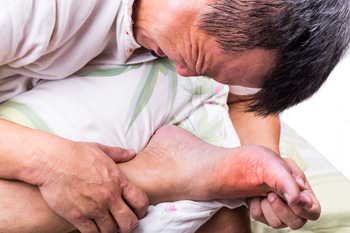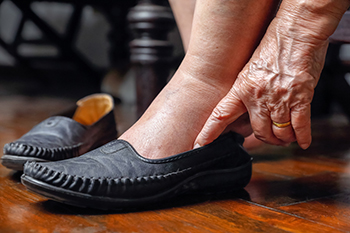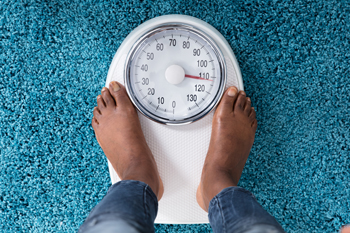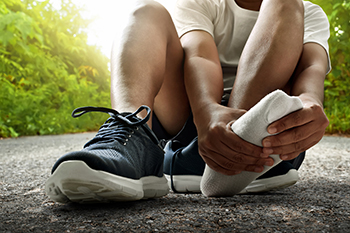Connect With Us
Blog
Items filtered by date: May 2023
What Is Gout?

Gout is a form of arthritis that can be extremely painful. Gout occurs as crystals that form in the joints of the big toe from consuming purine-rich foods. These foods include red meat, shellfish, and drinks that contain large amounts of sugar. These purines convert to uric acid, and an abundance of uric acid can cause the big toe to become inflamed. The toe may turn red and become swollen, causing the skin to pull tightly surrounding the affected joint. Many people make lifestyle choices that may lead to developing gout. Being overweight, drinking excess alcohol, and eating foods laden with purines may contribute to the onset of gout. There may be existing health conditions like high blood pressure or thyroid disorders that can lead to increased uric acid levels. If you have had one or many gout attacks, it is strongly suggested that you seek the counsel of a podiatrist who can help you to manage this uncomfortable condition.
Gout is a foot condition that requires certain treatment and care. If you are seeking treatment, contact Dr. Sunny Sajjad, DPM, MS, DABPM from Virginia Run Foot & Ankle . Our doctor will treat your foot and ankle needs.
What Is Gout?
Gout is a type of arthritis caused by a buildup of uric acid in the bloodstream. It often develops in the foot, especially the big toe area, although it can manifest in other parts of the body as well. Gout can make walking and standing very painful and is especially common in diabetics and the obese.
People typically get gout because of a poor diet. Genetic predisposition is also a factor. The children of parents who have had gout frequently have a chance of developing it themselves.
Gout can easily be identified by redness and inflammation of the big toe and the surrounding areas of the foot. Other symptoms include extreme fatigue, joint pain, and running high fevers. Sometimes corticosteroid drugs can be prescribed to treat gout, but the best way to combat this disease is to get more exercise and eat a better diet.
If you have any questions please feel free to contact our office located in Leesburg, VA . We offer the newest diagnostic and treatment technologies for all your foot and ankle needs.
Do Your Child's Feet Hurt?
Problems Caused by Tight Shoes

Wearing shoes that are too tight can either cause foot conditions or make existing problems more painful. For that reason, being aware of a proper fit when buying shoes for any reason is important, especially in this era of online shopping. Among the many foot problems related to wearing tight shoes are bunions, corns, hammertoes, and ingrown toenails. When purchasing shoes, measure your feet properly beforehand to have both the correct length and width. Be sure that your foot does not feel pinched or cramped within the shoe, in addition to ensuring the toes are not being squeezed together. The structure and materials of the shoe itself are as important as its appearance. The width and depth of the toe box should allow ample room for the toes to move freely in, and the heel should slip easily into the back of the shoe. Check for adequate support and cushioning, particularly if you have bunions, hammertoes, or flat feet. When you try on the shoes, it is beneficial to wear the foot coverings you would have on while wearing them. If you are having difficulty finding the proper shoes to fit your feet, it is suggested that you consult a podiatrist for more information.
It is important to find shoes that fit you properly in order to avoid a variety of different foot problems. For more information about treatment, contact Dr. Sunny Sajjad, DPM, MS, DABPM from Virginia Run Foot & Ankle . Our doctor will treat your foot and ankle needs.
Proper Shoe Fitting
Shoes have many different functions. They cushion our body weight, protect our feet, and allow us to safely play sports. You should always make sure that the shoes you wear fit you properly in order to avoid injuries and deformities such as: bunions, corns, calluses, hammertoes, plantar fasciitis, stress fractures, and more. It is important to note that although a certain pair of shoes might be a great fit for someone else, that doesn’t mean they will be a great fit for you. This is why you should always try on shoes before buying them to make sure they are worth the investment. Typically, shoes need to be replaced ever six months to one year of regular use.
Tips for Proper Shoe Fitting
- Select a shoe that is shaped like your foot
- Don’t buy shoes that fit too tight, expecting them to stretch to fit
- Make sure there is enough space (3/8” to ½”) for your longest toe at the end of each shoe when you are standing up
- Walk in the shoes to make sure they fit and feel right
- Don’t select shoes by the size marked inside the shoe, but by how the shoe fits your foot
The shoes you buy should always feel as good as they look. Shoes that fit properly will last longer, feel better, and improve your way of life each day.
If you have any questions, please feel free to contact our office located in Leesburg, VA . We offer the newest diagnostic and treatment technologies for all your foot care needs.
Excess Body Weight and the Feet

Being overweight increases the risk of many health-related issues, including foot problems and pain. One’s gait can become altered from obesity, putting one at greater risk for foot, ankle, and other injuries. Eating healthy and exercising regularly is the recommended route to losing weight, however, it can be challenging to accomplish movement when experiencing foot pain. Tips to overcome this conundrum include starting an exercise program slowly. Wear well-fitting, comfortable, and supportive shoes along with padded socks to help protect the feet from injuries. Practice good foot hygiene to avoid potential trouble spots that might interfere with progress. If you are overweight and want to begin a movement program but are concerned about the ability of your feet to cooperate without excessive discomfort, it is suggested that you consult with a podiatrist about how to best proceed.
Obesity has become very problematic at this point in time and can have extremely negative effects on the feet. If you’re an obese individual and are concerned about your feet, contact Dr. Sunny Sajjad, DPM, MS, DABPM from Virginia Run Foot & Ankle . Our doctor can provide the care you need to keep you pain-free and on your feet.
Obesity and Your Feet
Since your feet are what support your entire weight when standing, any additional weight can result in pain and swelling. Being overweight is one of the main contributors to foot complications.
Problems & Complications
Extra Weight – Even putting on just a few extra pounds could create serious complications for your feet. As your weight increases, your balance and body will shift, creating new stresses on your feet. This uneven weight distribution can cause pain, even while doing the simplest tasks, such as walking.
Diabetes – People who are overweight are at serious risk of developing type-2 diabetes, which has a drastic impact on the health of your feet. As you get older, your diabetes might worsen, which could lead to loss of feeling in your feet, sores, and bruises. You could also become more prone to various infections.
Plantar fasciitis – Pressure and stress that is placed on muscles, joints, and tendons can trigger plantar fasciitis, which is an inflammation of tissue that forms along the bottom of the foot.
If you have any questions please feel free to contact our office located in Leesburg, VA . We offer the newest diagnostic and treatment technologies for all your foot and ankle needs.
Keeping Feet Healthy for Long Runs

When runners go from 5K runs to longer distances, their feet often start to hurt more. This may be the result of wearing running shoes that are too small, do not fit properly, or don’t provide the proper cushioning or arch support. Here are a few tips from experts that can help to keep your feet healthier as your running goals change. It starts with the shoes. It may be wise to measure your feet again to get the correct shoe size before purchase. Your feet are likely to expand more during longer runs, so make sure to account for that. It is also important to pay attention to the insoles, which add arch support and help absorb shock with each step. If you have specific foot problems, custom orthotic insoles from a podiatrist may be needed. Increase the amount of exercises you do to strengthen the feet so they will be able to handle increased mileage. Finally, post-run foot care is essential. This may include icing the feet, keeping them elevated, and stretching them. For more information on how to keep your feet healthy while running, it is suggested that you make an appointment with a podiatrist.
All runners should take extra precaution when trying to avoid injury. If you have any concerns about your feet, contact Dr. Sunny Sajjad, DPM, MS, DABPM of Virginia Run Foot & Ankle . Our doctor will treat your foot and ankle needs.
How to Prevent Running Injuries
There are a lot of mistakes a runner can make prior to a workout that can induce injury. A lot of athletes tend to overstretch before running, instead of saving those workouts for a post-run routine. Deep lunges and hand-to-toe hamstring pulls should be performed after a workout instead of during a warmup. Another common mistake is jumping into an intense routine before your body is physically prepared for it. You should try to ease your way into long-distance running instead of forcing yourself to rush into it.
More Tips for Preventing Injury
- Incorporate Strength Training into Workouts - This will help improve the body’s overall athleticism
- Improve and Maintain Your Flexibility – Stretching everyday will help improve overall performance
- “Warm Up” Before Running and “Cool Down” Afterward – A warm up of 5-10 minutes helps get rid of lactic acid in the muscles and prevents delayed muscle soreness
- Cross-Training is Crucial
- Wear Proper Running Shoes
- Have a Formal Gait Analysis – Poor biomechanics can easily cause injury
If you have any questions, please feel free to contact our office located in Leesburg, VA . We offer the newest diagnostic and treatment technologies for all your foot care needs.

